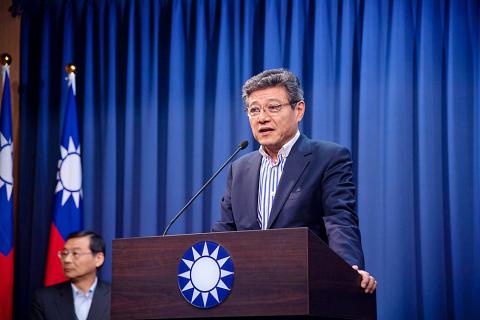Chinese Nationalist Party (KMT) Acting Chairman Lin Rong-te (林榮德) said he would urge all Central Standing Committee (CSC) members older than 60 to step down tomorrow, a call that has received a mixed reaction from other KMT members.
The committee is scheduled to meet tomorrow.
Lin, who turns 61 this year, told the Chinese-language China Times in an interview published on its Web site on Sunday evening that he would be resigning from the committee.

Photo: CNA
The departure of older members would allow younger KMT members to join the decisionmaking body, the newspaper cited him as saying.
As acting party chairman, he hopes to create a new platform for reforming the KMT, so his replacement could lead the party in exploring its future policies, he said.
Hopefully, KMT mayors, county and city councilors, and legislators would make up 80 to 90 percent of the CSC membership, he said.
Lin became acting chairman on Wednesday last week after former chairman Wu Den-yih (吳敦義) stepped down to take responsibility for the party’s drubbing in the Jan. 11 elections.
A new chairperson and Central Standing Committee are to be elected on March 7.
KMT Acting Secretary-General William Tseng (曾銘宗) yesterday told reporters that he strongly supports Lin’s idea, but the way in which it should be carried out should be “subtler.”
“Hopefully, we would able to reach an agreement with relatively senior committee members who do not have public support, so that they would forgo committee elections in the future,” he said at the Legislative Yuan in Taipei.
During tomorrow’s meeting, he also hopes to get a plan passed to establish a reform committee that would consist of the party’s mayors, county commissioners, legislators and councilors, as well as members who can represent the younger generations and academia, he said.
The KMT’s reform plans should cover four key areas: restructuring its decisionmaking body, its cross-strait stance and finances, and recruiting younger members, he said.
The KMT spends more than NT$200 million (US$6.68 million) annually, so it must reduce expenditures and increase its revenue, he said.
Lee Cho-ping (李昭平), who resigned from the CSC last week, agreed with Lin’s proposal to have older members step down.
The party must reform completely and allow its younger members to take on more responsibilities if it is to improve, he said.
However, CSC member Lu Hsueh-chang (呂學樟) said the key to reform should be passion, not age.
KMT regulations state that anyone who is a Central Committee or Central Advisory Committee member can take part in the CSC election, and there is no ban on those older than 60 from running, Lu said.
KMT legislator-at-large nominee Yen Yu-lan (葉毓蘭) said that Lin’s proposal could constitute age discrimination.
The party should include as many people as possible in its reforms, instead of “viewing things in black and white,” she told reporters in Taichung.
Additional reporting by Lin Liang-sheng and Chang Ching-ya

BUILDUP: US General Dan Caine said Chinese military maneuvers are not routine exercises, but instead are ‘rehearsals for a forced unification’ with Taiwan China poses an increasingly aggressive threat to the US and deterring Beijing is the Pentagon’s top regional priority amid its rapid military buildup and invasion drills near Taiwan, US Secretary of Defense Pete Hegseth said on Tuesday. “Our pacing threat is communist China,” Hegseth told the US House of Representatives Appropriations Subcommittee on Defense during an oversight hearing with US General Dan Caine, chairman of the Joint Chiefs of Staff. “Beijing is preparing for war in the Indo-Pacific as part of its broader strategy to dominate that region and then the world,” Hegseth said, adding that if it succeeds, it could derail

CHIP WAR: The new restrictions are expected to cut off China’s access to Taiwan’s technologies, materials and equipment essential to building AI semiconductors Taiwan has blacklisted Huawei Technologies Co (華為) and Semiconductor Manufacturing International Corp (SMIC, 中芯), dealing another major blow to the two companies spearheading China’s efforts to develop cutting-edge artificial intelligence (AI) chip technologies. The Ministry of Economic Affairs’ International Trade Administration has included Huawei, SMIC and several of their subsidiaries in an update of its so-called strategic high-tech commodities entity list, the latest version on its Web site showed on Saturday. It did not publicly announce the change. Other entities on the list include organizations such as the Taliban and al-Qaeda, as well as companies in China, Iran and elsewhere. Local companies need

CRITICISM: It is generally accepted that the Straits Forum is a CCP ‘united front’ platform, and anyone attending should maintain Taiwan’s dignity, the council said The Mainland Affairs Council (MAC) yesterday said it deeply regrets that former president Ma Ying-jeou (馬英九) echoed the Chinese Communist Party’s (CCP) “one China” principle and “united front” tactics by telling the Straits Forum that Taiwanese yearn for both sides of the Taiwan Strait to move toward “peace” and “integration.” The 17th annual Straits Forum yesterday opened in Xiamen, China, and while the Chinese Nationalist Party’s (KMT) local government heads were absent for the first time in 17 years, Ma attended the forum as “former KMT chairperson” and met with Chinese People’s Political Consultative Conference Chairman Wang Huning (王滬寧). Wang

CROSS-STRAIT: The MAC said it barred the Chinese officials from attending an event, because they failed to provide guarantees that Taiwan would be treated with respect The Mainland Affairs Council (MAC) on Friday night defended its decision to bar Chinese officials and tourism representatives from attending a tourism event in Taipei next month, citing the unsafe conditions for Taiwanese in China. The Taipei International Summer Travel Expo, organized by the Taiwan Tourism Exchange Association, is to run from July 18 to 21. China’s Taiwan Affairs Office spokeswoman Zhu Fenglian (朱鳳蓮) on Friday said that representatives from China’s travel industry were excluded from the expo. The Democratic Progressive Party government is obstructing cross-strait tourism exchange in a vain attempt to ignore the mainstream support for peaceful development